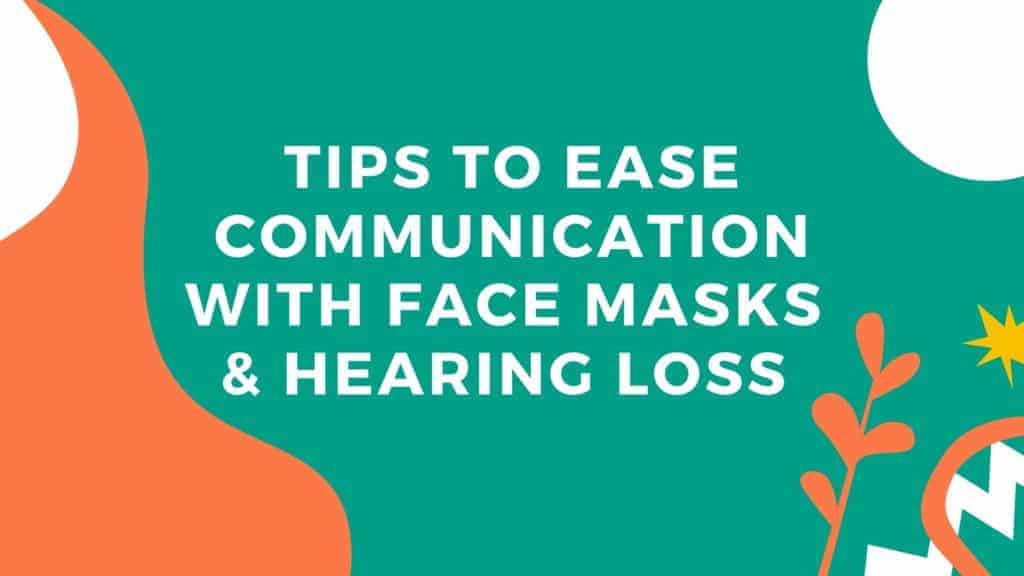
- How to Properly Clean Your Hearing Aids - April 15, 2024
- How to Handle Ear Infections With Hearing Aids - April 5, 2024
- Strategies for Working Professionals with Hearing Loss - March 27, 2024
The world has transformed in the last year, and we are now quite acclimated to wearing face masks in public spaces. Despite our acceptance of the inevitability of wearing masks for the time being, that doesn’t make it any easier to communicate with them. With limited visual and acoustic information, masks can make it hard for anyone to carry on a conversation. Yet the real challenge is posed to those with untreated hearing loss. Relying on scant information in a conversation can make it more difficult than ever to get by. Let’s consider the specific challenges posed by face masks as well as the potential ways to work around these constraints on conversational ability.
Face Masks and Conversation
When we converse unhindered by face masks, we use much more than the sound of words to make sense of the world. We watch body language and facial expressions to understand the context of speech. We also may be watching mouth movements without even noticing that we are doing so. This ability to see the face move fills in some of the gaps in speech where there is competing noise or a confusing pronunciation of a word. As you might imagine, this visual information is even more useful for someone with hearing loss. Masks cover this crucial part of the face, making communication more difficult than ever.
Clear masks are one innovation that some people have adopted, but they are not widely used. The clear plastic panel around the mouth tends to get fogged up, as well, making it difficult to see once again. Visual information is not the only thing limited by face masks. When your face is covered with paper or fabric, the audio quality is muffled. Not only is the overall decibel level of sound reduced but the mask also acts as a “low pass filter” reducing the level of the high frequencies. Consonants tend to be in that higher range, so this muffling effect can make it more difficult than ever to understand speech.
Some Helpful Tips
If you have hearing loss and have struggled to communicate while wearing a face mask, there are a few simple things you can do to make it easier on yourself and others. Even if you don’t have hearing loss, consider abiding by these tips for your friends, neighbors, and loved ones who do have hearing loss. First, try to face in the direction of the person you are speaking to. Don’t hesitate to raise the volume of your speech a bit to compensate for the muffling provided by the mask. When possible, try to speak clearly with full enunciation rather than mumbling. If you have hearing loss, take the opportunity to not only disclose that condition to others but also to suggest an accommodation strategy. You might want to ask the other person to stand closer to you, within the range of social distancing guidelines. If you find that it’s not good enough to stand six feet apart, you could suggest stepping outside where masks might not be necessary. Although it might seem like an involved process to walk outdoors, important conversations can be much more effective outside without masks, making it worth the effort.
Treating Hearing Loss
If you have hearing aids, you are in much better shape to navigate these situations, but there are a few discomforts and challenges that persist. The style of mask can make a big difference for your comfort, and you will likely want to get a mask that doesn’t have over-the-ear straps. The style of mask with two separate ties can be more comfortable and keep from irritating your hearing aids. Some people combine their hearing assistance with smartphone apps that provide real-time voice-to-text captioning. Bluetooth receivers can add to the assistance, as well, using the smartphone as an additional microphone in extreme cases. If you follow these tips, you should have no problem communicating with a mask and hearing aids at the same time.
However, if you have untreated hearing loss, the time is now to get the assistance you need. Despite the fact that masks are less necessary now than they were a year ago, your hearing aids will continue to provide assistance in post-pandemic life. If you are ready to seek treatment for hearing loss, contact us today!
